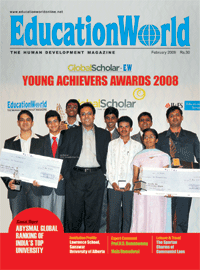Inspiring young achievers
 I was inspired by your cover story profiling the eight young finalists of the GlobalScholar-EW Young Achievers Awards 2008 (EW February). All of them deserve praise for driving themselves hard to attain national and international success.
I was inspired by your cover story profiling the eight young finalists of the GlobalScholar-EW Young Achievers Awards 2008 (EW February). All of them deserve praise for driving themselves hard to attain national and international success.
Their achievements apart, I was really impressed that each young achiever wanted to contribute towards the improvement of society and particularly the under-privileged. Magician-cum-painter A.V.K. Srikanth gave his best painting to be adapted as a greeting card by the National Association for the Blind, while Shruthi Sulappa is using her paintings to educate students and the public about the importance of environment conservation. Learning about the dreams and ambitions of these eight extremely talented young achievers gives me hope for the future of India.
Sanjana Bhatia
Jalandhar
Exemplary young achiever
Thanks for your cover story (EW February). Though all the eight young achievers must be commended for their accomplishments, environmentalist B.N. Umesh must be singled out for special praise. The story of how this son of a farm labourer has single-handedly planted 10,000 trees in north Karnataka is truly inspiring. Unlike his peers, he didn’t have the advantage of a private school education or the support of educated parents pulling out all stops to help their children succeed. His dedication to the worthy cause of tree planting is indeed exemplary.
I also want to thank the three judges for signing personal cheques of Rs.25,000 each to help Umesh in this great cause. He deserves more encouragement and sponsorship.
Raman Nayak
Mumbai
Adjudication suggestions
Congratulations to the eight winners of the GlobalScholar-EW Young Achievers Awards (EW February). Their achievements in the face of unsupp-ortive environments deserve special recog-nition and appreciation. That GlobalScholar and EducationWorld have come forward to enco-urage them in their quest for excellence is a welcome initiative.
However I have a suggestion to improve the selection process of the awards. After the eight finalists present their achievements to the audience and judges, audience members should be invited to vote the winners. If this is cumbersome, brief profiles of the eight finalists can be published in EW before the event, and readers could be invited to vote the winners. After counting their votes, the audience choice should be compared with those of the judges, with judges having the final say. This will raise enthusiasm for the event as well as increase the number of entries.
Urvashi M.
Bangalore
Harsh verdict
The special report on Delhi University was well written and packed with numbers and facts (EW February). But the facts and figures depressed me. Despite being India’s top university, DU has failed to make a mark in the world of international higher education.
But I think that we are missing something here. Universities such as Harvard, Yale and Oxford which top the world rankings, have been there for hundreds of years. Comparatively DU is young — about 85 years old. More-over unlike its western counterparts which have corpus funds of billions of dollars, DU receives hardly any philanthropic contributions. Wealthy Indians just don’t give money to education institutions. I feel that you were a bit too harsh on DU. Its ranking in the top 300 universities of the world is a great start.
Kaustav Adhikari
Bangalore
Full autonomy prescription
You have hit the nail right on the head in your special report ‘Abysmal global ranking of India’s best university’ (EW February). The primary reason for the poor ranking of Delhi University — India’s top university — in the QS-Times Higher Education World University Rankings 2008, is government policy towards tuition fees. Fearing student unrest and resistance, the government has let tuition fees in DU and its affiliated colleges stagnate at the 1950s level. The result is that the varsity is forever cash strapped and unable to invest in world-class infrastructure and high-quality faculty. Hence it’s not surprising that DU is unable to deliver higher education on a par with the best universities in the world.
I believe for DU to realise its potential and break into the top 100 rankings worldwide, the government should grant the university full academic and administrative autonomy, including the freedom to decide market-determined tuition fees for study programmes.
Amit Saxena
Delhi
Pertinent advice
I really appreciated Mala Ramadorai’s Teacher-to-Teacher column on ‘Enabling learning by discovery’ (EW February). Her criticism of chalk-n-talk pedagogy is valid and incisive. I too, feel strongly that conventional pedagogies employed in India’s schools are inadequate to attain global standards of education and satisfy the future needs of industry and academia. The problem with most schools and colleges in India is that they don’t inculcate zeal and ardour for knowledge and education. Instead the style of teaching has created aversion among the students towards learning.
Regretably there hasn’t been any significant improvement in teaching techniques for decades. I would request the teachers’ community to heed Ramadorai’s advice and switch to modern and creative ways of teaching.
G. Vivek Venkatesh
Chennai